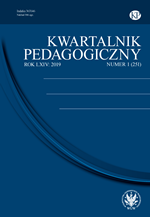Self-organization of students’ activity as a condition of effective electronic educational communication
Self-organization of students’ activity as a condition of effective electronic educational communication
Author(s): Nina L. Sungurova, Natalya B. Karabushchenko, Daria MikhailovaSubject(s): Social Sciences, Education, Sociology
Published by: Wydawnictwa Uniwersytetu Warszawskiego
Keywords: self-organisation of activity; network activity; educational style; psychological efficiency
Summary/Abstract: The virtual environment allows solving new educational problems, but also generates new educational, psychological and pedagogical effects, new experience. E-learning, like traditional learning, is realised with the help of three most common technologies: self-learning technology; one-to-one learning technology; one-to-many learning technology. At the same time, e-learning interaction involves self-organisation of the individual and the organisation of joint distributed activities of students. Self-organisation of the individual is understood as the ability to structure personal time, tactically plan own activities, purposefully act in solving problems. The effectiveness of educational activities of students in the conditions of e-learning depends on how students are guided by their own internal principles, the ability to create conditions for the optimization of learning tasks and actions.The article presents the results of theoretical and empirical research of self-organisation of the individual in the context of effective distribution of time resources, describes the psychological strategies of network activity of students, highlights the features of educational styles, levels of psychological efficiency of interaction with information technology.
Journal: Kwartalnik Pedagogiczny
- Issue Year: 251/2019
- Issue No: 1
- Page Range: 163-174
- Page Count: 12
- Language: English
- Content File-PDF

